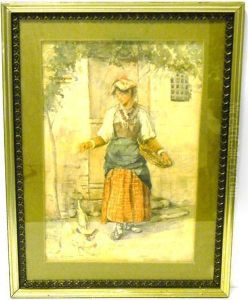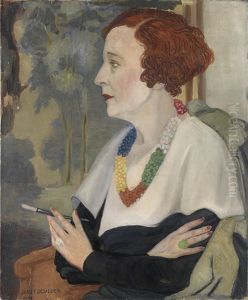Janet Scudder Paintings
Janet Scudder was an American sculptor and feminist who made a significant impact in the realm of public art and garden sculpture. Born Netta Deweze Frazee Scudder on October 27, 1869, in Terre Haute, Indiana, she later adopted the name 'Janet' as she began her career in art. She grew up in a time when opportunities for women in the arts were limited, yet she managed to break through societal barriers and establish herself as a professional artist.
Scudder began her formal art education at the Cincinnati Art Academy in the late 1880s and later continued her studies at the Art Academy of Chicago. She moved to Paris in the mid-1890s, where she further honed her skills at the Académie Vitti, studying under Frederick MacMonnies, a well-known American sculptor. Her time in Paris was formative, and she was deeply influenced by the Art Nouveau movement and the city's vibrant artistic community.
Scudder's work is characterized by its whimsical and joyful nature, often incorporating themes of children, animals, and allegorical figures. She is best known for her garden sculptures, fountains, and small decorative pieces. Her bronze sculptures were distinctive for their playful charm and elegant craftsmanship. Scudder's art was well-received, and she participated in various exhibitions, including the Paris Salon and the Armory Show in New York City.
One of her most notable works is the 'Frog Fountain', which epitomizes her style that blends a sense of fun with traditional sculptural forms. Her public commissions and garden sculptures were popular among the American elite, and she enjoyed the patronage of prominent figures of the time.
Despite her success, Scudder faced challenges as a woman in a male-dominated field. She was an active advocate for women's rights and often spoke out against the limitations placed on women artists. Her feminist beliefs were integral to her identity and she lived her life independently, never marrying, which was uncommon for women of her era.
Janet Scudder's career slowed down as tastes in art shifted and the Great Depression affected the market for luxury art items like hers. She spent her later years in Rockport, Massachusetts, and Villefranche-sur-Mer, France, continuing to work but with less public visibility. Scudder passed away on June 9, 1940, in Rockport. Her legacy is preserved in the collections of various museums and as part of public and private gardens. Her life and work remain an inspiration to those who seek to overcome barriers and pursue their creative passions regardless of societal expectations.

